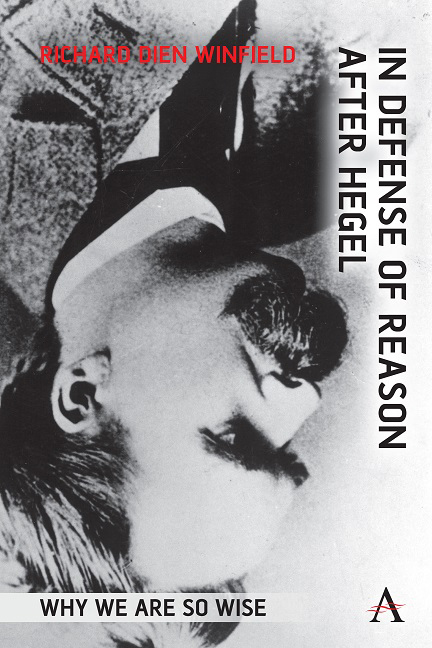Book contents
- Frontmatter
- Contents
- Acknowledgments
- Introduction
- 1 Why We Are So Wise: Hegelian Reflections on whether Reason Can Be Enhanced
- 2 Self-Determination in Logic and Reality
- 3 Hegel’s Overcoming of the Overcoming of Metaphysics
- 4 On Contradiction: Hegel versus Aristotle, Sextus Empiricus, and Kant
- 5 Overcoming Actuality: How Hegel Frees Us from the Prison of Modality
- 6 Time and Reason
- 7 Hegel and the Problem of Consciousness
- 8 Hegel and the Origin of Language
- 9 The Logic of Right
- 10 A Dream Deferred: From the US Constitution to the Universal Declaration of Human Rights
- 11 World Spirit on the Campaign Trail in Georgia: Can the Philosophy of Right Be a Guide to Social Reform?
- 12 The Classical Nude and the Limits of Sculpture
- Bibliography
- Index
11 - World Spirit on the Campaign Trail in Georgia: Can thePhilosophy of Right Be a Guide to Social Reform?
Published online by Cambridge University Press: 26 May 2022
- Frontmatter
- Contents
- Acknowledgments
- Introduction
- 1 Why We Are So Wise: Hegelian Reflections on whether Reason Can Be Enhanced
- 2 Self-Determination in Logic and Reality
- 3 Hegel’s Overcoming of the Overcoming of Metaphysics
- 4 On Contradiction: Hegel versus Aristotle, Sextus Empiricus, and Kant
- 5 Overcoming Actuality: How Hegel Frees Us from the Prison of Modality
- 6 Time and Reason
- 7 Hegel and the Problem of Consciousness
- 8 Hegel and the Origin of Language
- 9 The Logic of Right
- 10 A Dream Deferred: From the US Constitution to the Universal Declaration of Human Rights
- 11 World Spirit on the Campaign Trail in Georgia: Can the Philosophy of Right Be a Guide to Social Reform?
- 12 The Classical Nude and the Limits of Sculpture
- Bibliography
- Index
Summary
Contesting the Enslavement of Theory to Practice
As citizens and philosophers, straddling history and reason, as well as persuasion and dialectic, we are easily tempted to follow Marx's 11th Thesis on Feuerbach, according to which our theorizing about the world should serve the end of changing it. A whole school of philosophy has paid homage to this injunction, as if subordinating theory to practice could possibly make sense. There can be no normative critique if reason forfeits its autonomy to become subservient to anything else. Yet what could be more antithetical to the sovereignty of reason than making an emancipatory goal the conditioning telos of all understanding? If that end lords over theory, emancipation cannot itself be determined within theoretical inquiry. Instead, philosophy must accept the aim to which it should submit as an unquestionable ground whose content and authority reason can never establish. This leaves practice hopelessly dogmatic, aiming at a liberation whose character is beyond rational disputation. It can thus be no surprise that the “Critical Theorists” who have followed Marx's 11th Thesis on Feuerbach have never developed a concrete normative theory of the reality of freedom into which we are supposed to transform our world.
From the Practical Conditioning of Knowing to the General Impasse of Transcendental Philosophy
The enslavement of philosophy to practice that follows from Karl Marx's 11th Thesis on Feuerbach more broadly reflects the general epistemological view that knowing is always conditioned by practical concerns. The leading lights of Critical Theory (e.g., Max Horkheimer, Theodor W. Adorno et al.), who follow Marx’ thesis, are all students of Martin Heidegger, who advanced the existentialist dogma that the conditions of cognition lie not in some pure other-worldly, noumenal self, but rather in a concrete embodied subjectivity, very much practically entangled within the world it inhabits. Whether one characterizes that entanglement in terms of biological, psychological, or conventional constraints, the enfeeblement of reason is the same. Thought remains bound to practical demands that rob reason of the unconditioned independence that could allow for unqualified wisdom rather than relative opinion. The proponents of this disempowerment of reason incoherently purport to comprehend the practical entanglement of thought that robs reason of the autonomy on which depends the truth of their own global claims.
- Type
- Chapter
- Information
- In Defense of Reason after HegelWhy We Are So Wise, pp. 181 - 196Publisher: Anthem PressPrint publication year: 2022



